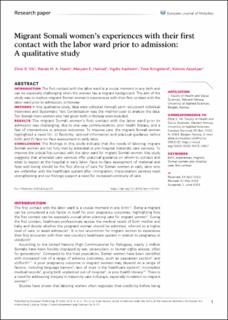| dc.contributor.author | Vik, Eline Skirnisdottir | |
| dc.contributor.author | Hashi, Randa M. A. | |
| dc.contributor.author | Hamud, Maryam E. | |
| dc.contributor.author | Aasheim, Vigdis | |
| dc.contributor.author | Kringeland, Tone Åslaug | |
| dc.contributor.author | Aasekjær, Katrine | |
| dc.date.accessioned | 2023-03-17T13:05:51Z | |
| dc.date.available | 2023-03-17T13:05:51Z | |
| dc.date.created | 2022-10-19T12:17:47Z | |
| dc.date.issued | 2022 | |
| dc.identifier.citation | European Journal of Midwifery. 2022, 6 (July), . | en_US |
| dc.identifier.issn | 2585-2906 | |
| dc.identifier.uri | https://hdl.handle.net/11250/3059034 | |
| dc.description.abstract | Introduction:
The first contact with the labor ward is a crucial moment in any birth and can be especially challenging when the woman has a migrant background. The aim of the study was to explore migrant Somali women’s experiences with their first contact with the labor ward prior to admission, in Norway.
Methods:
In this qualitative study, data were collected through semi-structured individual interviews and Systematic Text Condensation was the method used to analyze the data. Ten Somali-born women who had given birth in Norway were included.
Results:
The migrant Somali women’s first contact with the labor ward prior to admission was challenging, due to one-way communication, poor health literacy, and a fear of interventions or adverse outcomes. To improve care, the migrant Somali women highlighted a need for: 1) flexibility, tailored information and practical guidance before birth; and 2) face-to-face assessment in early labor.
Conclusions:
The findings in this study indicate that the needs of laboring migrant Somali women are not fully met by antenatal or pre-hospital maternity care services. To improve the critical first contact with the labor ward for migrant Somali women, this study suggests that antenatal care services offer practical guidance on whom to contact and what to expect at the hospital in early labor. Face-to-face assessment of maternal and fetal well-being should be the first choice of care for Somali women in early labor who are unfamiliar with the healthcare system after immigration. Interpretation services need strengthening and our findings support a need for increased continuity of care. | en_US |
| dc.language.iso | eng | en_US |
| dc.publisher | EU European Publishing | en_US |
| dc.rights | Navngivelse 4.0 Internasjonal | * |
| dc.rights.uri | http://creativecommons.org/licenses/by/4.0/deed.no | * |
| dc.title | Migrant Somali women’s experiences with their first contact with the labor ward prior to admission: A qualitative study | en_US |
| dc.type | Peer reviewed | en_US |
| dc.type | Journal article | en_US |
| dc.description.version | publishedVersion | en_US |
| dc.rights.holder | © 2022 Vik E. S. et al | en_US |
| dc.source.pagenumber | 1-7 | en_US |
| dc.source.volume | 6 | en_US |
| dc.source.journal | European Journal of Midwifery | en_US |
| dc.source.issue | July | en_US |
| dc.identifier.doi | 10.18332/EJM/150584 | |
| dc.identifier.cristin | 2062747 | |
| cristin.ispublished | true | |
| cristin.fulltext | original | |
| cristin.qualitycode | 1 | |

